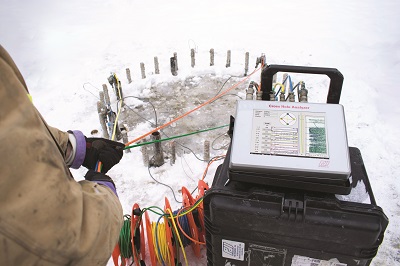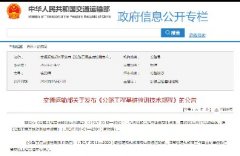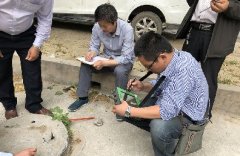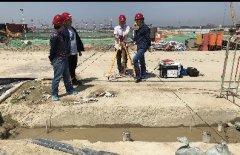
The Cross-Hole Analyzer determines the quality and consistency of the concrete of drilled shafts, slurry walls, bored piles, cast-in-situ piles and other types of concrete foundations. PDI’s Cross-Hole Analyzer (CHAMP-Q) is ideal for testing four probes (six profiles) in just one pull, saving time and money. CHAMP-Q has color coded wires for easy identification of probe receiving/transmitting. The CHAMP-Q meets or exceeds the specifications of ASTM D6760 and several other crosshole sonic logging codes and standards.
Test the entire shaft with CHAMP-Q
Once a shaft is prepared with PVC or steel tubes during construction, transceivers are lowered into the access tubes and probe one will transmit a high frequency signal that travels through the concrete and is detected by the other probes which are acting as receivers. This action is repeated with the other probes being automatically configured as transmitters sequentially allowing up to six profiles to be scanned with a single pull. As these sensors are raised and/or lowered along the length of the foundation, the CHAMP-Q displays and records the strength of the received signal, as well as the time from signal emission to signal arrival as a function of depth.
In CSL testing, scanning various tube combinations for the entire shaft allows evaluation of concrete quality and defect location along the length and by quadrant. With the CHAMP-Q, the user can pull four cables at once, each color coded for easy identification, and via a newly designed, space efficient tri-pod.
The CHAMP-Q Tablet is portable, light and rugged featuring:
-
Fast and accurate field measurements
-
Large sun light readable color LCD touch screen that is highly visible in all lighting conditions.
-
Optimized data entry for real time analysis onsite (waterfall diagram)
-
Replaceable battery and USB ports for quick and easy data transfer
CHAMP’s CHA-W Data Processing Software provides powerful tools for data analysis such as:
-
Ability to simultaneously review six data profiles
-
History mapping of already collected data
-
First Arrival Time (FAT) detection
-
Easy defect identification
-
Two methods of signal strength evaluation (energy or amplitude)
CHA-W reporting tools comprise of user customized graphs and tables:
-
Sonic Map – Signal strength versus time and depth in traditional waterfall diagram
-
First Arrival Time – Signal travel time from transmitter to receiver, versus depth
-
Wave-speed Plot – Wave-speed (an indicator of concrete strength) versus depth
-
Wave–speed Table – Wave-speeds, means and standard deviations
-
Energy or Amplitude Plot – Signal strength versus depth
-
Defect location graphically (horizontal redline) and in table format
Main Unit
Physical
-
Size: 320 X 250 X 68 mm (12.6 x 9.8 x 2.7 inches)
-
Weight: 5 Kg (11 lbs.)
-
Temperature range: 0 to 40°C (32 to 104° F) operating; -20 to 65°C (-4 to 149° F) storage
-
Display: 26.4cm (10.4”), sunlight readable, resolution 1024 X 768
-
Built in capacitive touch screen
-
Video Outputs: HDMI
-
Power: 4-hour continuous data collection with internal 12V battery
-
Charging Time: 6-hour maximum
Electronic
-
Microsoft Windows® 10 Operating System
-
128 GB SSD internal drive
-
Ethernet port
-
4 USB ports
-
12-bit analog to digital (A/D) converter
-
Sampling rate: 500 kHz, 1 MHz and 2 MHz, user selectable (equivalent measuring accuracy 2μs, 1μs and 0.5μs)
-
Scan rate: 32 scans/seconds
-
Record size: 250, 500 and 1000 points, user selectable
-
User adjustable gain, trigger level, and transmit power level
Other
-
Operates in English or SI Units
-
Furnished with CHA-W software
-
Full one-year warranty
-
Technical manual provided in PDF form on a USB Drive
Probes
Physical
-
Size: 215 mm length x 25 mm diameter
-
Element: ceramic
-
Housing: nickel plated brass
-
Independent depth encoder for each probe
-
Maximum measuring distance (probe separation): 3m
Electronic
-
Receiver: tuned to 45 KHz nominal
-
Transmitter frequency (nominal): 45 KHz
-
Transmitter voltage: 800 volts
Cables
-
Cable material: heavy duty polyurethane outer jacket
-
Cable length: 60, 100 or 150 m
-
Cables spooled over tripod (standard) or with the pile encoder

 Enquiry:hkmarketing@epc.com.hk
Enquiry:hkmarketing@epc.com.hk  Whatsapp Enquiry: +85261990717
Whatsapp Enquiry: +85261990717














